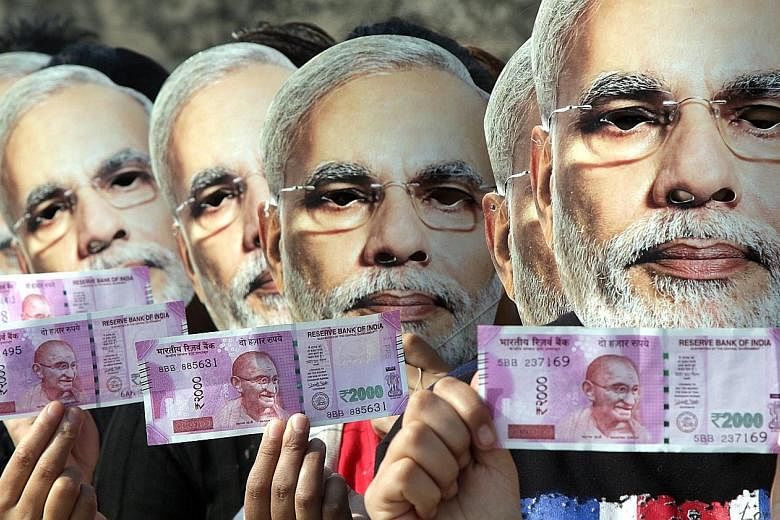MUMBAI • As Indians struggle with the chaos caused by last month's sudden banning of their 500- and 1,000-rupee notes, money-laundering networks are spreading across the country, seizing on a new market in helping people turn their cash hoards into legal tender.
The government has said it will scrutinise large cash deposits and money with undeclared origins, and will tax or penalise depositors. That has created a scramble for ways to turn so-called black money, the local term for cash that has evaded taxation, into white.
So far, the policy aimed at reducing the scale of the black economy and bringing more people into the tax net is, in the short term, leading to just the reverse: money-laundering, tax-avoidance, new opportunities for existing organised crime, the evolution of the longstanding hawala money-transfer system and the start of new illicit networks.
The rise of underground networks illustrates the challenge Prime Minister Narendra Modi faces in trying to stamp out entrenched corruption in a country where cash accounts for 98 per cent of consumer transactions - and raises the prospect that he will pay a steep political price for a move that threw India into chaos.
Money-laundering networks promise to deliver clean cash by routing it through India's hinterlands.
One method relies on high-turnover businesses, such as trading houses or manufacturing operations, which report cash revenue to the government.
With their sales disrupted by millions of Indians' sudden inability to access the cash ban, these businesses can make up shortfalls by accepting old cash from money- laundering networks, calling it revenue, and then returning a portion - typically 50 per cent of the total - in new notes.
Some of these evasion methods include:
TRIBAL EXEMPTIONS
These focus on bringing the money into the system through the bank accounts of people with tax exemptions, such as farmers or those who derive income from agricultural activities, said a lawyer who is part of a Mumbai money-laundering network. Certain tribal communities in India's north-eastern states, including Nagaland, Manipur and Tripura, are exempted from paying taxes on income from any sources.
THE HAWALA SYSTEM
The hawala system, active in India for decades, is based on trust or family connections and operates using the mispricing of goods, financial loopholes and hidden accounting procedures to take in cash in one location and pick it up in another.
Using the hawala networks, agents offer to replace old currency notes with new, and offer services to pick up the money in remote locations, the lawyer said.
PLANES, TRAINS, AUTOMOBILES
Individuals transport millions of rupees on trains or vehicles, with the big money-laundering networks chartering flights to carry crateloads of cash to India's north-east from small airfields, the lawyer said. To halt these operations, the civil aviation ministry has said that approvals must be sought from the police chief of the district for flights taking off from airfields not controlled by the government, and that police and the pilot must screen customers and passengers before departure.
'SELF-HELP'
People move their currency notes to multiple accounts belonging to their household staff or those with little money, in amounts below the 250,000 rupee ($5,220) limit so as not to trigger inquiries from the tax department.
TEMPLE CONVERSIONS
There are also reports of temples being used to convert the black money into new currency notes.
Donations to religious institutions in old notes are exempt from the ban, but a television channel caught on camera a priest at the Govardhan Temple in Mathura in northern India who offered to convert banned currency notes into new ones.
People are also using weddings as a way to deposit the currency into bank accounts, as cash gifts received during marriage are exempt from taxation.
PROPERTY INVESTMENT
The real estate industry, which accounted for a large share of illicit deals with an estimated 10 to 15 per cent of its transactions done with black money even before the currency ban, is attracting further investments with banned notes.
An e-mail offer sent out by a Mumbai property brokerage specified that the purchaser could pay in banned bills for two-bedroom apartments in the upscale Mumbai suburb of Khar.
The offer price was about 30 million rupees, or about 10 per cent more than other comparable units.
HARD ASSETS
Sales of hard assets are increasing wherever sellers or retailers will accept the bills, even after the government banned them from doing so.
A person who bought 1 million rupees worth of gold from a jewellery store in Mumbai last week said he was able to use old 1,000-rupee notes, paying a 20 per cent premium - with the jeweller then expected to turn to money-laundering networks to legitimise the proceeds.
Mr Modi, who announced the demonetisation of 86 per cent of the country's currency in a bid to crack down on tax evasion through black money, has denounced the evasion networks that are springing up.
BLOOMBERG

